Everybody has their own productivity system. Mine changed quite a lot in the past year, especially the last 6 months. It’s time to pause, reflect and introspect a little and see what works and not and adjust accordingly to be more productive in the future.
Notion (the PARA method)
It all started with reading the book Building a Second Brain. Before reading it, I was using Notion already but there was no system. I pretty much use it like how I used EverNote 15 years ago when I first started digital note taking. After reading the book, I set my Notion to use PARA method and now I can’t go back.
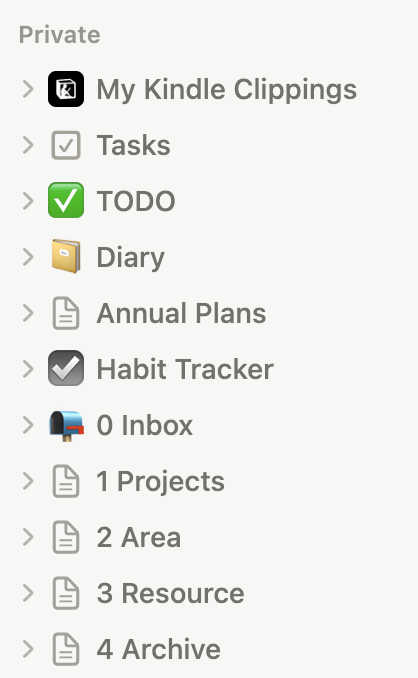
I use it to
- take notes for everything. Notion is becoming my 2nd brain
What works
- Most of time I could find the thing that I need from notion
- I can quickly add new notes to where it belongs. No longer I have to struggle to find a place for a new note only later I couldn’t find it
What doesn’t work
- I need to spend a bit more time organizing it, especially work related notes
Weekly Review
I got this idea while previewing the BASB workshop and learned the mechanics from todoist’s The Weekly Review article. I’ve been doing it since.
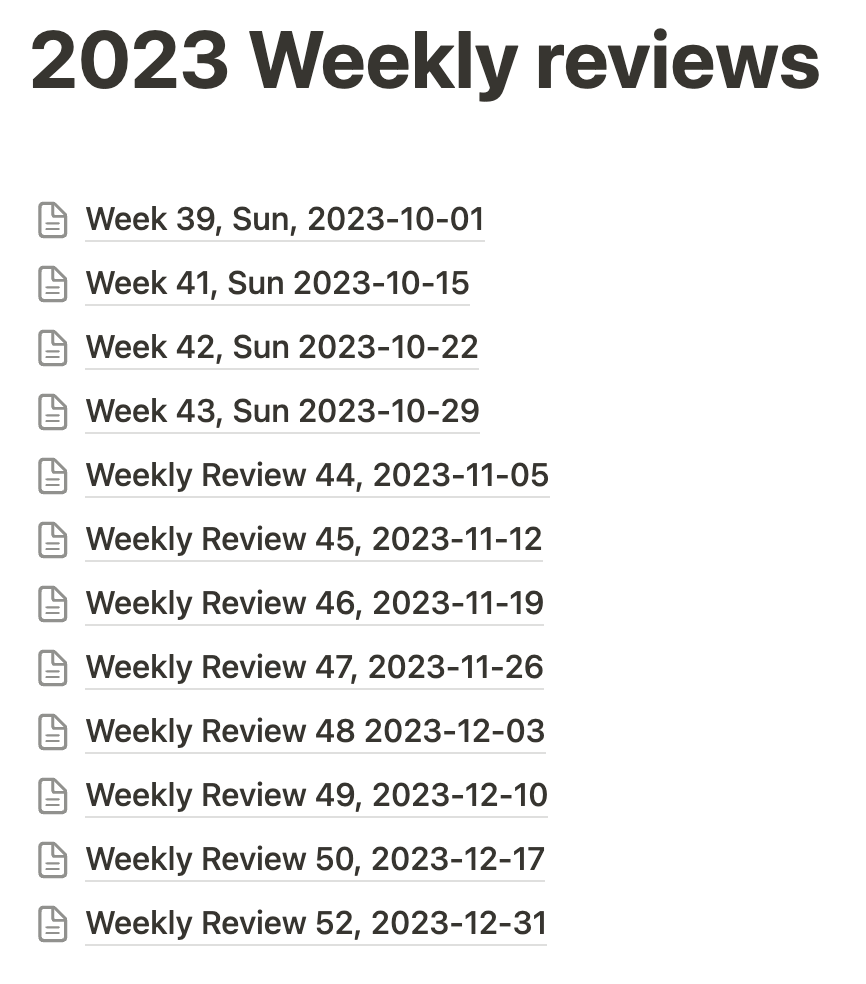
I use it to
- clean up notion inbox so it’s stay organized
- transfer my loose thoughts from Day One Journal(below) to notion
- Check if I’ve made any progress in my goals, if I’m deviating from the path (most likely) and re-focus on those that by setting next week’s tasks
What works
- Transferring loose thoughts is very useful. It makes me relaxed and not stressful as I know they’ll be revisited on a weekly and then monthly basis. And they’ll be safely stored and easily accessed in notion
What doesn’t work
- most tasks I set up for a week cannot be completed. It makes me doubt the usefulness of it. The discouraging feeling sometimes makes me skip it.
Task Manager
I started using Task Manager or TODO list pretty much the same time I started weekly review. My task manager is nothing more than a database in Notion created using a template like the to-do list.
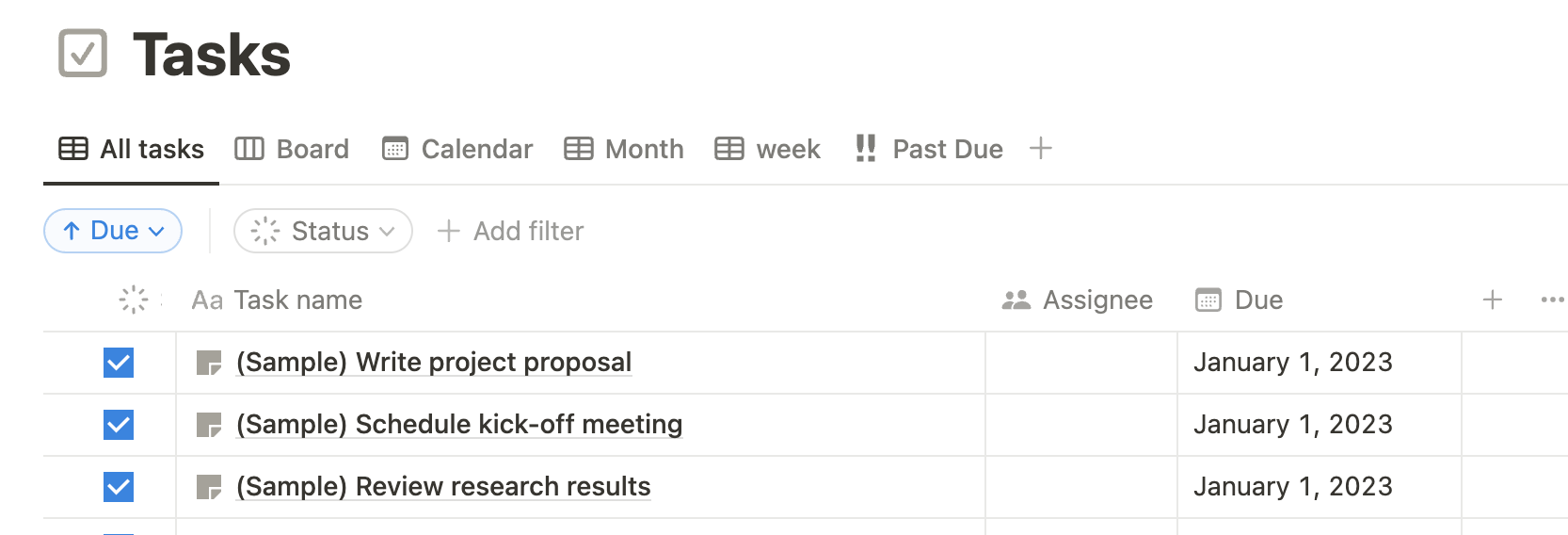
I use it to
- Use it a TODO list to track things I should do (e.g., research stock, visa follow-up, call to make appointments)
- plan my week according to my OKRs and other life goals and include life admin tasks
What works
- administrative tasks e.g. paperwork for parent visa, renewing insurance, buying security camera
- tasks that are easily measurable and achievable (e.g. making appointments)
- tasks that are urgent and at high stake (e.g. following up with visa application, renew insurance)
What doesn’t work
- ost learnings tasks. For example, leetcode, grokking system design. One cause is I underestimate effort needed and overestimate time available.
- writing (e.g. writing blogs, finish LP worksheets)
- research or tasks with no clear goals
- reflection and introspection needed tasks (e.g. reflect projects at work such as gift sub)
Day One Journal
I forgot where I got the idea from but I’ve never missed a single day using Day One (well, except the first few weeks when I still adapt it). Every morning I open it and answer the following questions:
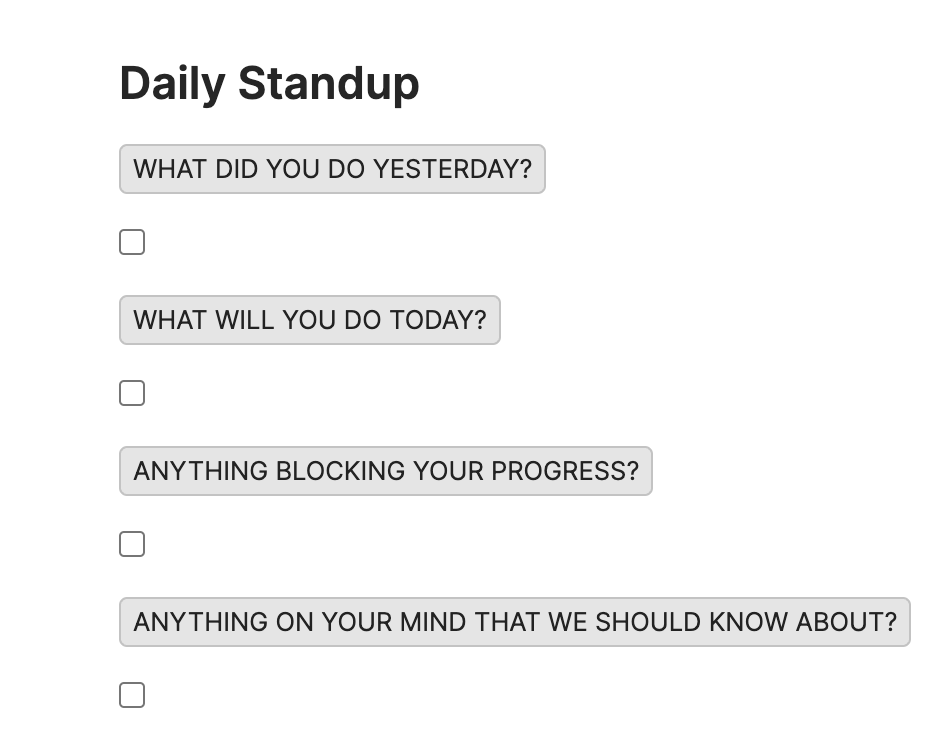
Then during the weekly reviews I’ll copy any entries under “Anything on your mind that we should know about?” section in the past week to notion.
I use it to:
- Do my daily standup: plan for the day and review what’s done yesterday
- Collect loose fleeting thoughts in my head
- push me to identify the blockers and try to unblock
What works
- Captured thoughts are recorded in weekly reviews and will mostly be assigned action items during monthly review. Whether or not those action items are executed or are they effective in addressing my original thoughts are up for debate but this frees my brain from worrying about losing any thoughts and I could focus on things at hands
What doesn’t work
- The daily plan and review doesn’t achieve its purpose of getting things done. I couldn’t recall a single day I’d finished all the TODOs. Actually most of days I couldn’t even finish half of the tasks.
- I rarely put any thought into the blocker section. Not that I don’t have any but due to I usually skip it.
Time-boxing
This is adopted after I read that time-boxing is the No.1 productivity hack. I decided to give a try as it does sound reasonable. However, my experience with it so far hasn’t been positive. It’s mainly because in practice I would not or cannot honor the time-box I created and this generates a defeating feeling. Currently I use my personal google calendar to do it.
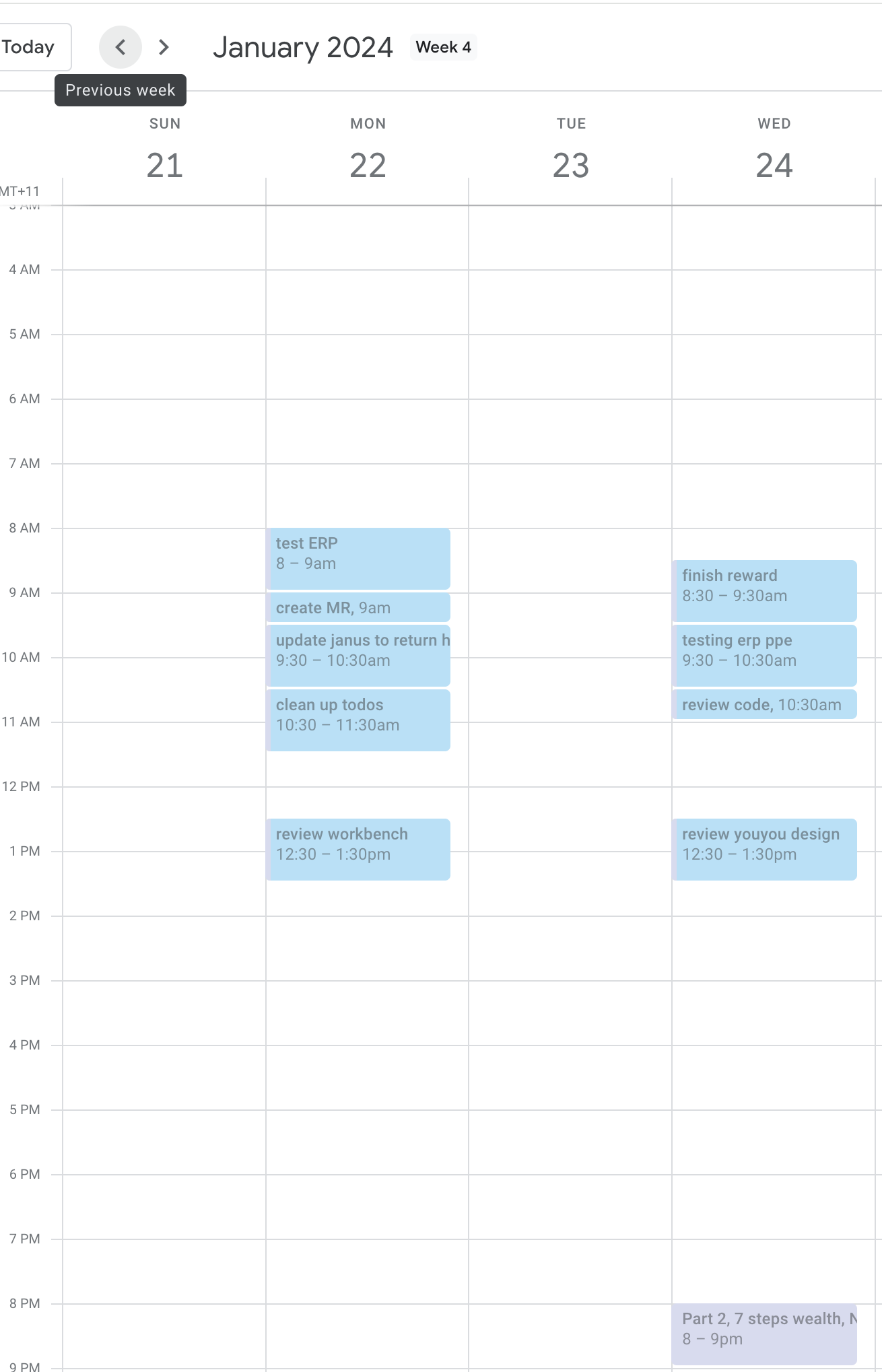
I use it to
- allocate time to the tasks I plan to do for the day in the morning
What works and not
- Occasionally a time-box will remind me to focus only on the essentials that’s needed to get a job done. But many times the time is not enough and I will keep extending the time from 1h to 2h then to 3h.
- This is the worst of all in terms of effectiveness. I’ve never finished all the tasks within the time-boxes and most of time I have to create the same entries for the next few days
Focus(Mac), Digital Wellbeing App Timer (Phone)
I bought Focus a few years ago. For Digital Welling App Timer I’ve been using similar things since I was using Iphone 7 but the Apps I restrict keep changing
I use them to
- Limit time spent on YouTube, Telegram, Yahoo Finance and, well it’s embarrassing to say, but it’s watching porn (I have a porn issue, which hopefully someday I could write about)
What works
- Less time spent on things above
What doesn’t work
- I still waste a lot of time on other things and constantly checking for notifications. For example, recently I waste quite a lot of time in Polymarket checking any new market and change in odds.
- I can still watch porn from lesser-known websites as it’s impossible to add all of them to Focus’ ban list
- for Twitter, it’s even harder. The timer is not enough as I can change the timer setting (e.g. remove it). So I uninstall it. I can still re-install it and then uninstall
Zen Space(Phone)
Zen Space is an app on my OnePlus that allow you to block time without getting interrupted. In the Deep Zen mode, you can’t exit the app while it’s running. I mostly use Light Zen mode
I use it to
- Prevent getting distracted (e.g. checking telegram, wechat, finance)
What works
- It works as a pomodoro tool. It prevents me from playing with phone while I’m trying to focus on something
What doesn’t work
- While it’s effective at preventing phone distraction, it can’t help with distractions from sources other than my phone such as laptop, Lark (at work). For example, when focusing on doing leetcode problems with Zen mode turned on, I could still have the urge to check email, betting odds and sometimes just down right visiting porn sites.
Conclusion
- Day One: keep using it but use blocker section more. Use specific, measurable, achievable, relevant and time-bound tasks
- Task Manager: like above use SMART goals
- Time-boxing: keep using it. Focus on essentials. Try 80/20 rules. Be creative
- Focus, Digital Wellbeing App Timer: keep using them. Add more frictions. Add more sites to deny lists.
- Zen Space: should use much more.
- I need help with focusing. I’m too easily distracted while doing things that require high level of focus, such as leetcode, writing and working on complex systems. I need to stop random thoughts or other seemingly important tasks interrupt my focus
- Re-evaluate in 2 months